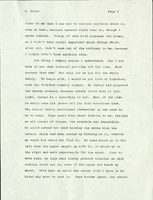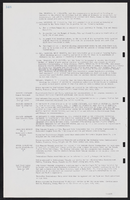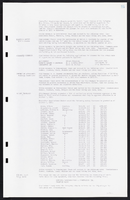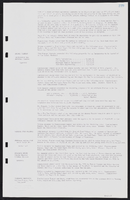Search the Special Collections and Archives Portal
Search Results

Irene Cepeda interview, April 24, 2019: transcript
Date
Description
Interviewed by Monserrath Hernández, Nathalie Martinez and Rodrigo Vázquez. Irene Cepeda is a woman dedicated to serving the Latinx as well as all minority groups in education in Southern Nevada. As a Las Vegas native, she grew up alongside the Latinx community here and is a proud Latina from Nicaraguan roots. She is dedicated to uplifting the Latinx community through her work with the Latino Youth Leadership Conference and college access specialist at Nevada State College. Now, as representative of District D on the Clark County School District Board of Trustees, she seeks to tackle the issues the district faces from acts of White supremacy to a lack of funding for English Language Learner families.
Text

Transcript of interview with Doris Evans by Lance Kenny, March 12, 1977
Date
Archival Collection
Description
On March 12, 1977, Lance Kenny interviewed realtor, Doris Evans (born in Dexter, Missouri) at her place of business, Doris Evans Realty, located at 1100 Cahlan Drive, Las Vegas, Nevada. This interview covers Boulder City and Las Vegas [1937-1977]. During the interview Doris discusses real estate, local hotels, early transportation, and social recreation. She also mentions the nuclear tests, crime, environmental changes, and marriage and family life in Boulder City and Las Vegas. Doris’s business partner, Patty (Renette Beringer), is also present during the interview and helps Doris recall the year they started Doris Evans Realty in Las Vegas, Nevada.
Text

Transcript of interview with Dr. John Shepherd by Lisa Gioia-Acres, November 21, 2008
Date
Archival Collection
Description
Dr. John Richard Shepherd shares the background of his early life in southern Illinois, his father's and grandfather's occupations, and his educational journey through college and medical school. His army experiences in Chicago and Alabama convinced him and his wife to look for a warm dry climate in which to live, and they relocated to Las Vegas in 1968. Dr. Shepherd recalls the businesses and housing surrounding Sunrise Hospital, the difficulties getting his specialty listed in the phone book, and renting his first office space from Nate Adelson. He also describes taking out a loan to install ophthalmology equipment, hiring an office manager with medical accounting experience, and doing cataract surgery in a way that basically hadn't changed for decades. The passing of the Medicare bill back in 1966 caused Dr. Shepherd's practice to build up quickly. He details the many ways eye surgery changed, including the invention of the intraocular lens and the phacoemulsification procedure. He mentions his and Dr. Shearing's contributions to ophthalmology — better designed lenses and surgical techniques - which they taught to other doctors from all over the country. Dr. Shepherd discusses radial keratotomy, which was a precursor to laser and later LASIK surgery, and describes a lens implant technique he learned in Russia from Dr. Fyodorov. He goes on to share anecdotes and stories of his interactions with patients, his travels as a consultant and as a surgical teacher for Project Orbis, and meeting Fidel Castro. He speaks candidly about his successes and his failures as well. Dr. Shepherd retired in 2006 and immediately enrolled in a Master's program and earned a degree in military history. After a long and distinguished career, after receiving many accolades and awards, he and his wife are enjoying life, splitting their time between Sun Valley, Idaho, and Las Vegas.
Text

Interview with Lilias Gordon, May 14, 2004
Date
Archival Collection
Description
Text

Chapter from autobiography by Bella Stern, 1980
Date
Archival Collection
Description
In this chapter, Stern describes her upbringing in Russia and fleeing to Poland. It is accompanied by a letter to the publishing company William Morrow.
Text

Yeon-Kyung (Mar) Chung oral history interview: transcript
Date
Archival Collection
Description
Oral history interview with Yeon-Kyung (Mar) Chung conducted by Emilee Caivin on November 10, 2021 for Reflections: The Las Vegas Asian American and Pacific Islander Oral History Project. In this interview, Yeon-Kyung (Mar) Chung talks about her upbringing in Korea and her educational history, studying Spanish abroad in Spain and Italy before earning her graduate degree in Latin American Studies from the University of Texas, Austin. Mar Chung talks about her move to Las Vegas, Nevada in 1999 to enroll at the College of Southern Nevada and the University of Nevada, Las Vegas to pursue pharmaceutical studies like her parents. She talks about her experience as a single mother, her path to citizenship in the United States, and the Las Vegas Asian American community. Mar Chung also reflects on differences between how she was raised compared to the upbringing of her two children.
Text
Audio clip from interview with Glenn Tredwell, March 4, 2016 and April 14, 2016
Date
Archival Collection
Description
In this clip, Glenn Tredwell discusses how he came to Las Vegas, Nevada in 1975.
Sound



